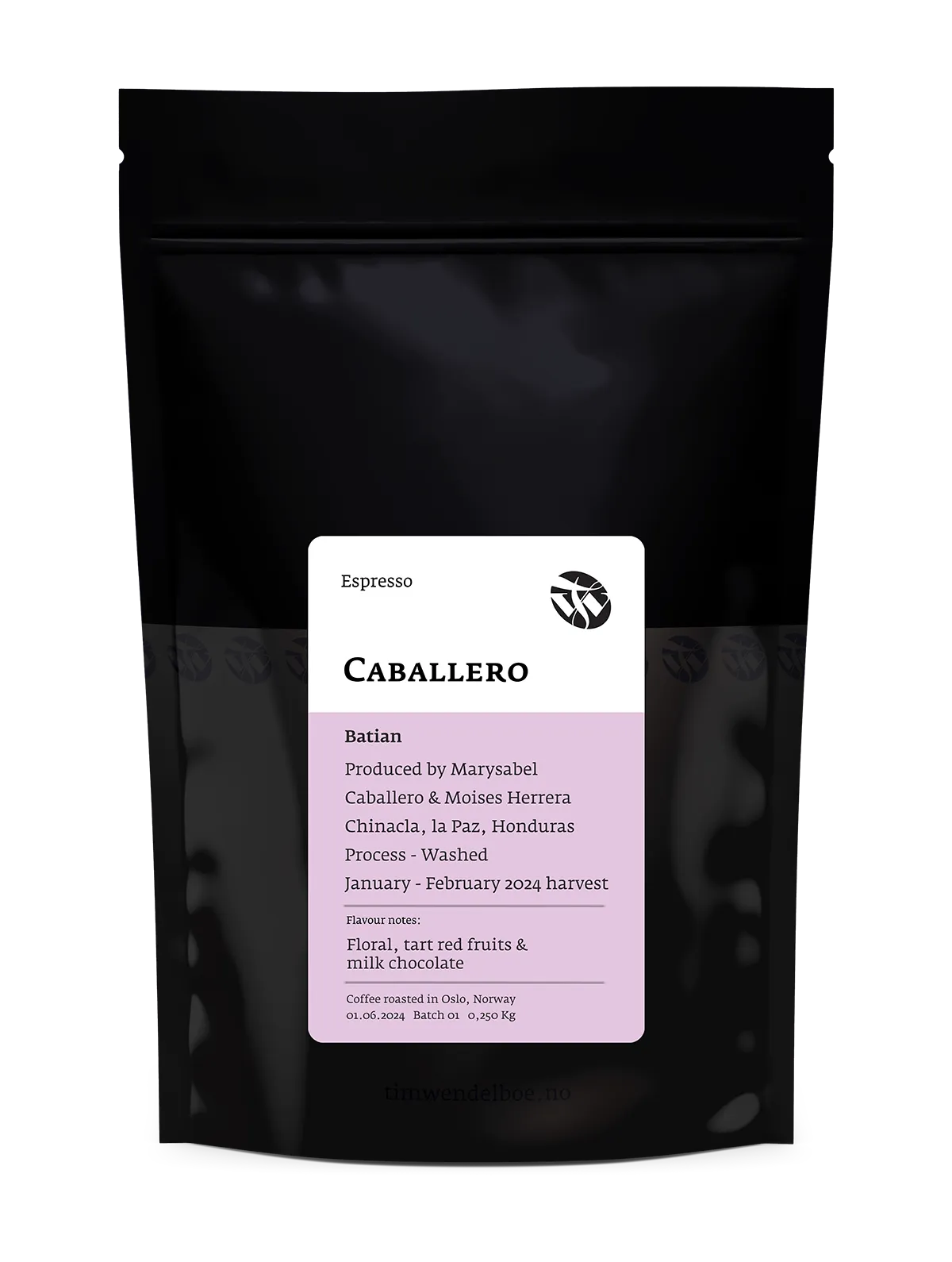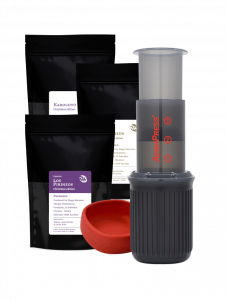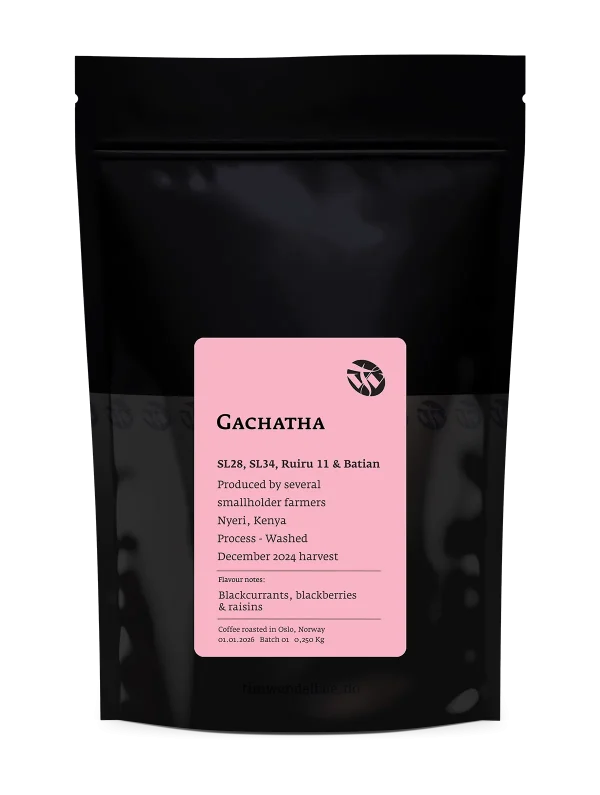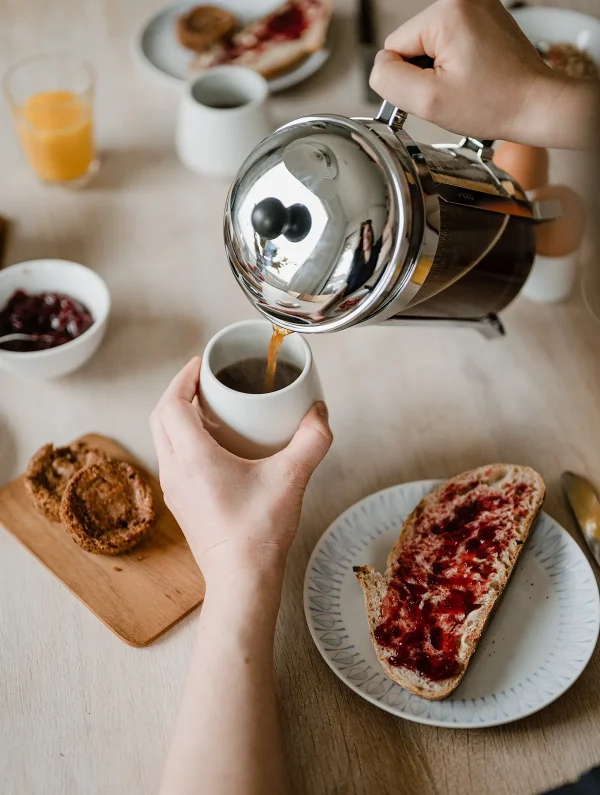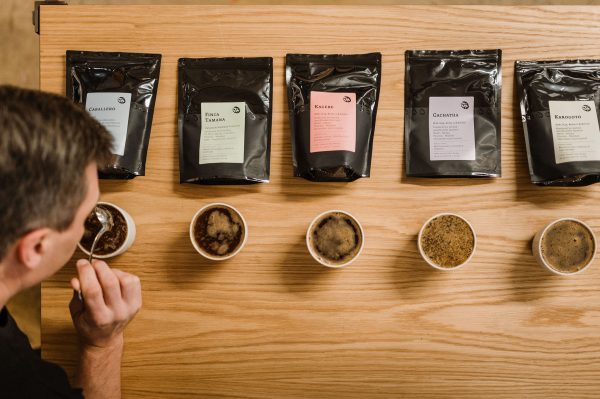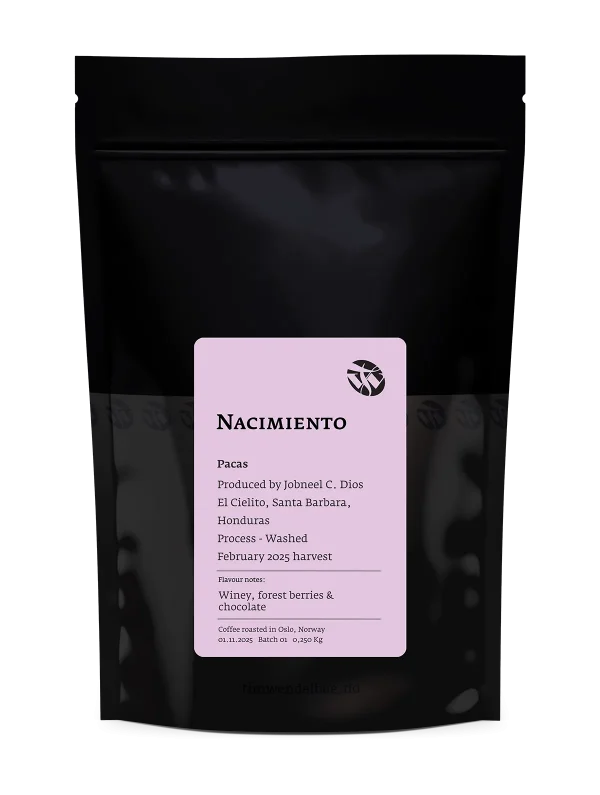| Cultivar | Batian |
|---|---|
| Flavour Notes | Floral, tart red fruits & chocolate |
| Producer | Marysabel Caballero & Moises Herrera |
| Country | Honduras |
| Region | Chinacla, La Paz |
| Process | Washed |
| Harvest | January – February 2024 |
| Roast Profile | Espresso Roast |
| Bag Size | 250g |
| Contents | Whole Coffee Beans |
Caballero Batian Espresso
kr205.00
Expect a sweet and smooth coffee with notes of milk chocolate, florals & tart red fruits from this Kenyan cultivar grown in Honduras.
Out of stock
Additional information
Tim's Notes
Batian is actually a Kenyan hybrid cultivar but this particular coffee was grown in Honduras by our friends Marysabel Caballero and Moises Herrera. Some years ago they planted a small amount of these trees and we are fortunate to be able to buy the majority of their production of this cultivar.
This is the sixt year we are able to offer this coffee and I am happy to say that we were able to buy a bigger quantity than previous years. In fact Moises and Marysabel are so happy with the Batian, both with yield and quality, that they have decided to plant more of it.
This year the Batian tastes slightly more pronounced than it has in previous years showing notes of violets & florals with tart berry notes and a sweet milk chocolate like finish.
This is the sixt year we are able to offer this coffee and I am happy to say that we were able to buy a bigger quantity than previous years. In fact Moises and Marysabel are so happy with the Batian, both with yield and quality, that they have decided to plant more of it.
This year the Batian tastes slightly more pronounced than it has in previous years showing notes of violets & florals with tart berry notes and a sweet milk chocolate like finish.
Cultivar
Batian is a cultivar that was created at the Coffee Research Station / Coffee Research Institute in Ruiru, Kenya. It was released in Kenya in 2010 as an alternative to the traditional SL28 and SL34 cultivars that are often attached by leaf rust and coffee berry disease. Although Batian was created to be a rust resistant cultivar, in later years it has shown to only be tolerant to coffee leaf rust.
The cultivars used in the original crosses were: SL28, SL34, Rume Sudan, N39, K7 SL4 and the Timor Hybrid.
Among coffee buyers there are many opinions wether Batian can match the flavours of the traditional Kenyan SL cultivars. In our opinion a high quality Batian coffee can for sure be as good as many SL28 and SL34 coffees but it has a slight different flavour profile.
The cultivars used in the original crosses were: SL28, SL34, Rume Sudan, N39, K7 SL4 and the Timor Hybrid.
Among coffee buyers there are many opinions wether Batian can match the flavours of the traditional Kenyan SL cultivars. In our opinion a high quality Batian coffee can for sure be as good as many SL28 and SL34 coffees but it has a slight different flavour profile.
Process
Picking and sorting
- Ripe cherries are hand picked by local pickers. The pickers are paid extra to sort ripe cherries from the unripe while they are picking. Sorting is done by simply putting the cherries in separate bags.
- The coffee cherries are de-pulped in the afternoon and the mucilage is partially removed from the parchment coffee with the use of a mechanical mucilage remover. Then the parchment coffee is fermented over night before the remaining mucilage is washed off with clean water in a washing channel which helps sorting floaters and undeveloped beans from the denser and more developed coffee. After washing the excess water is removed from the parchment coffee with the help of a centrifuge. Then the coffee is ready for drying.
- The coffees we buy from Marysabel and Moises are all dried slowly on raised beds covered with shade nets. These beds are set up by their house in Marcala where the climate is drier than at the wet mill which is located higher up in the mountains. During drying the coffees are raked throughout the day to ensure even drying. At night it gets covered to prevent condensation and the risk of the coffee gaining moisture in the drying process. Once the coffees are dried, they are stored in air tight grain pro bags before the they get milled and packed in vacuum packs and shipped to Norway.
Shipping
For our Norwegian customers, we offer three shipping options:
- Pakke i Postkassen - With Pakke i Postkassen, tracking is provided, and delivery is estimated within 2-3 business days.
- Pakke til hentested - The parcel can be collected from a Post in Store, Post Office, parcel locker, or parcel box. This option includes tracking, with delivery expected within 1-5 business days.
- Norwegian Post, No Tracking (Brevpost) - This option does not offer tracking. Delivery is estimated within 2-5 business days.
How To Brew
Filter
- We strongly recommend using the correct measurements and brewing techniques when you brew our coffees. Use a digital scale both to measure water and coffee in order to get consistent results, and we recommend using between 60 to 70 grams of coffee per litre (1000g) of water, depending on the brewing method, water quality and coffee used.
- We strongly recommend using VST filter baskets. Both the 18g, 20g and the 22g basket is great for our coffee. The VST filters makes it a lot easier to extract the espresso properly which gives a lot more sweetness in the cup. They are also more or less identical to each other which makes it easy to be more consistent when brewing on several groups at the same time. You can buy the filters on our webshop, just make sure they fit your machine (ours fits all La Marzocco machines and machines with 58mm filter baskets). With the VST 18g filter basket, we recommend the following brewing parameters: 18-19g freshly-ground coffee, 25-35s brewing time, 35-38g of final brew liquid in the cup, 93°C-94°C brew water temperature.
Finca el Puente
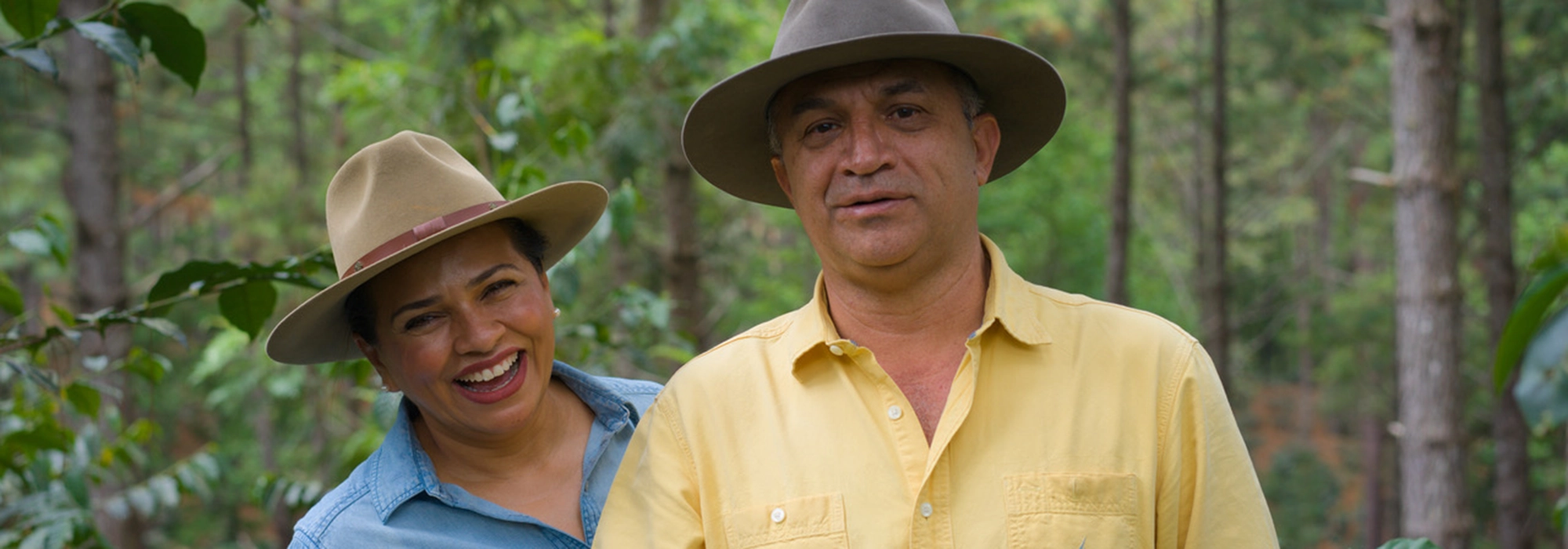
Marysabel Caballero is 3rd generation coffee farmer and together with her husband Moises Herrera they own and manage over 300 hectares of land divided in to several small farms near the town Marcala. Moises and Marysabel have consistently been producing some of the best coffees Honduras has to offer. For over a decade they have been winning many top places in the Honduras Cup of Excellence. In 2016 they managed to win 1st place with their Geisha coffee, but their first recognition was in the first Cup of Excellence competition in Honduras in 2004 when they won 2nd and 3rdplace with their Catuaí coffee.
Learn More About Finca el Puente
Transparency
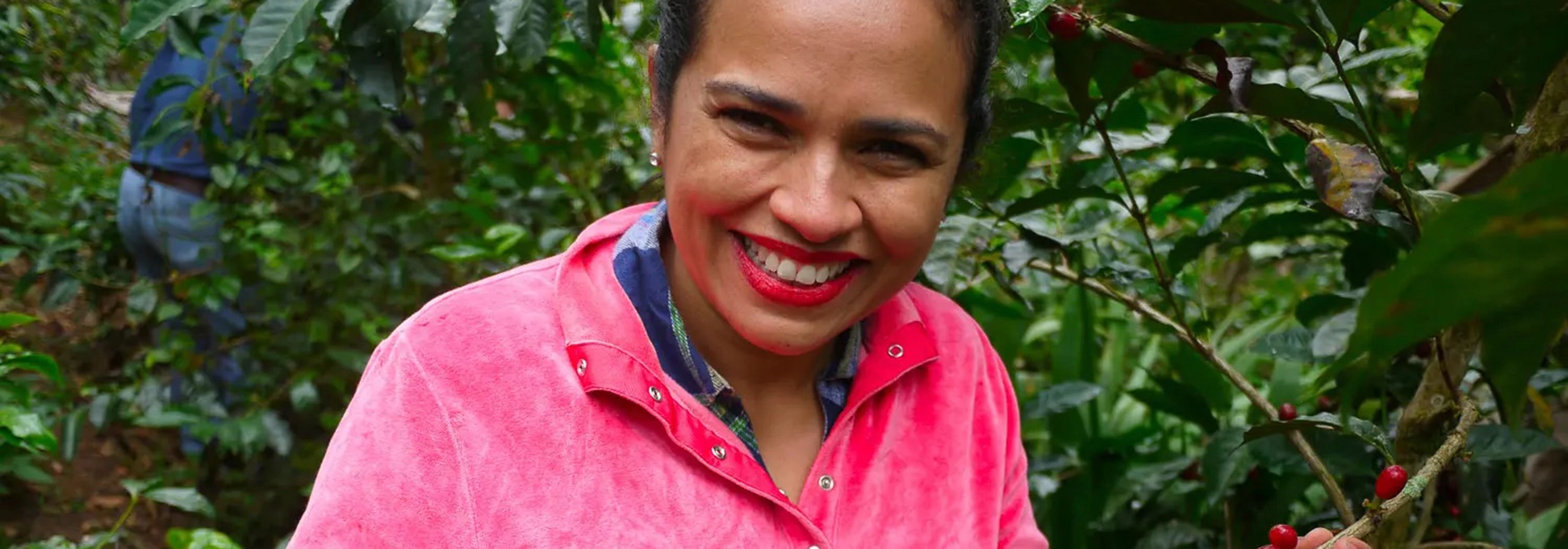
We buy coffee directly from Marysabel Caballero and Moises Herrera. They mill and pack their own coffee. Boncafe, the exporter, provides logistical service and the coffee is imported by ourselves directly to Norway. We have been buying coffee from the Finca el Puente every year since 2009 and we will continue to do so in future years.
Learn More About Transparency

